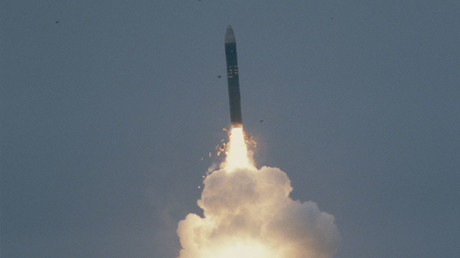US nukes in Europe & low strike threshold are direct violations of non-proliferation treaty – Moscow
Washington has failed to live up to its obligations under the Nuclear Non-Proliferation Treaty, Russia’s Foreign Ministry concluded, citing the US nuclear build-up in Europe and its new hawkish nuclear doctrine.
The ministry was commenting on the 2017 Report on Adherence to and Compliance With Arms Control, Nonproliferation, and Disarmament Agreements and Commitments released by the US State Department last week. The report found the US to be in full compliance with the NPT Treaty. “All US activities during the reporting period were consistent with obligations set forth in the NPT,” it states.
Moscow argues that this could not be further from the truth, since the US not only continues to carry out the so-called “joint nuclear missions” with European states, but, according to its own Nuclear Posture Review, also eyes expanding the practice.
“All this is a direct violation of the Articles I and II of the Treaty,” the ministry states, referring to the provisions that expressly prohibit nations to “transfer to any recipient whatsoever nuclear weapons” or hand over control over them.
Italy, the Netherlands, Belgium, Germany and Turkey currently host some 150 US-made B61 bombs at six bases, according to data cited by the Federation of American Scientists, which tracks US nukes. The weapons, the oldest in the US nuclear stockpile, are set to be replaced with new model B61-12 bombs starting in 2020. The estimated cost of the mammoth project has doubled over the years to over $10 billion, according to the National Nuclear Security Administration’s Office of Cost Estimating and Program Evaluation updated assessment.
Moscow previously warned Washington that the deployment of new B61-12 bombs to its allies in Europe would run counter to the US obligation under the NPT, but to no avail.
The US plans to upgrade and expand its already vast nuclear arsenal were outlined in the Trump administration’s hawkish Nuclear Posture Review (NPR). The review states the need to develop new types of low-yield warheads that would be placed on Trident D5 submarine-launched ballistic missiles (SLBMs) and on sea-launched nuclear-tipped cruise missiles.
READ MORE: Trump says he will meet Putin to discuss ‘arms race that is getting out of control’
Such an “unprecedented” nuclear build-up, partially justified by the “Russia threat” and Moscow’s “troubling” behavior, “significantly lowers the threshold of the use of nuclear weapons,” the Foreign Ministry warned.
Washington also lists a conventional attack as a valid reason for nuclear retaliation. The provision, which is the key shift from the previous US nuclear strategy, allows it to deploy nukes in response to an attack that results in mass casualties or targets key infrastructure.
“Against this backdrop, completely baseless allegations of a growing ‘Russian nuclear threat,’ peddled by Americans, look particularly cynical,” the Foreign Ministry states as it goes on to brush off the claims that Moscow, in turn, is mulling an overhaul of its nuclear policies arsenals.
“The provisions of our military doctrine concerning the use of nuclear weapons are deliberately distorted. The western public is being continuously told that Russia appears to review its stance on the place and the role of the nuclear weapons and focuses more and more on that. This does not correspond to the reality.”
Russia’s military doctrine, last updated in 2014, states that it would only use its nuclear arsenal if under attack by weapons of mass destruction, including nuclear weapons, or in case of a conventional attack when Russia’s sovereignty is at stake.
Shortly after Trump’s Nuclear Posture release, the Russian Foreign Ministry noted that while it essentially allows US policymakers “to treat almost any use of military force as a reason for carrying out a nuclear strike against those deemed aggressors,” it, at the same time, is an “attempt to question [Moscow’s] right for self-defense.”
Pointing at the US’ refusal to ratify the Comprehensive Nuclear-Test-Ban Treaty (CTBT), that bans all nuclear explosions for both civilian and military purposes, the ministry said that it “deals a serious blow” to the treaty, which “has been signed and ratified by the majority of countries, including Russia,” and might be a part of a preparation for the renewal of nuclear tests by the US.
“Such policy by Washington runs contrary to their declared commitment to the goals of the nuclear non-proliferation,” the ministry said, arguing that other countries key to the regime may follow its lead, which can untimely lead to a new arms race.







Comments are closed.